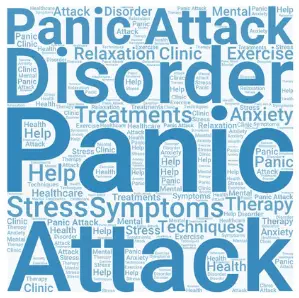If you’re wondering how to calm anxiety attacks, keep reading. First, you should know what an anxiety attack feels like. These attacks are real. You should also know how to cope with the anxiety attack itself. There are effective ways to deal with it. Below are some considerations that can help you cope with your anxiety attack. Follow these techniques, and you’ll soon stop having panic attacks forever.

What does an anxiety attack feel like?
When you’re experiencing an anxiety attack, you wonder: What does it feel like? We will see below the symptoms of anxiety attacks and provide coping tips to help you manage them. Deep breathing is a common relaxation technique to calm down and stop hyperventilation. Try concentrating on your favorite song and relax your muscles to reduce the feeling of losing control. Anxiety attacks often result from particular situations or circumstances. So try to remove yourself from these situations to prevent further attacks.
Anxiety attacks are related to the fight-or-flight response, our body’s reaction to perceived danger, threat or irrational fears. Anxiety attacks are usually shorter episodes that subside after the initial event or situation that causes the attack. These subside fast and rarely last more than 10 minutes. Symptoms may include shortness of breath, difficulty concentrating, chest pain, or a rapid heartbeat.
Effective ways to reduce anxiety
Some people find it helpful to engage in routines. Some people find it useful to take a 30-minute walk, while others enjoy meditation or yoga. Whatever your preference, finding a low-stress activity can help reduce anxiety. Try playing video games, reading, writing, or playing with a pet. Whatever you do, choose something that you enjoy doing. Make sure it doesn’t involve intense physical activity. If possible, do not exercise too close to bedtime.
Developing a plan is another helpful technique. The goal is to reduce your distance and time in the feared situation. Try to resist the urge to leave the situation. During the exposure, you can engage in relaxation and breathing exercises or read coping statements. One way to change your focus is by naming three things, making three different sounds, or moving three different body parts. Once you’ve learned how to deal with your anxiety, you can move on to other feared situations.
Effective Ways to Deal with an Anxiety Attack
While many people find that coping with an anxiety attack by yourself is effective, sometimes you need to seek professional help. You’ll need a medical check-up, especially if you’re experiencing a severe episode. A doctor can rule out any physical problems that may be causing your symptoms. Some drugs and recreational substances can exacerbate the symptoms of anxiety.
One effective way to distract yourself during an anxiety attack is to count backward from 100. Try counting backward in threes, also. Counting loose change can also help you focus. The act of concentrating on something outside yourself enables you to focus. Another way to distract yourself from a panic attack is to visualize something pleasant and calm. For example, you could think of a beautiful day or a relaxing vacation.
How Do You Calm an Anxiety Attack?
There are many ways you can calm an anxiety attack. One way is to try deep breathing exercises. Concentrating on your favorite song and relaxing your muscles can also help. Additionally, removing yourself from the situation causing the anxiety attack can be helpful. Finally, if you cannot calm down on your own, seek professional help.
How can you stop an anxiety attack?
One of the best ways to stop an anxiety attack is to distract yourself. Distraction is important for stopping an anxiety attack because it prevents the body from triggering the Stress Response. Distraction can come from calling a friend, organizing your desk, or going for a walk. Another method is to change your lifestyle. Try changing your diet and lifestyle habits to reduce the level of stress you experience. This way, you’ll feel better and reduce your anxiety attack symptoms.
To distract yourself during a panic attack, count backward. “Counting backward from 100 in 3s helps me focus,” says Rob Cole, clinical director of mental health services at Banyan Treatment Centers. You can also count loose change. These help you focus and control your thoughts. It can also be beneficial to visualize an object that you find attractive. This will make it easier for you to focus on something external to you and will not cause a panic attack.
Anxiety attack Help
Knowing how to calm anxiety attack symptoms can improve your health and ability to function in social situations. The best way to calm down during an anxiety attack is to focus on the senses, like your breathing and stomach movements. When your symptoms are too overwhelming to handle, try to take a break from social settings and avoid interacting with people. If you cannot prevent the situation, let a trusted person know you are suffering from anxiety disorders.
Anxiety attacks can trigger specific fears, worries, or everyday stressors. Stress and anxiety can accumulate over time and result in an attack.
How to handle a panic attack?
When you have a panic attack, it cannot be very comforting. Your heart may feel like it’s racing or pounding, and you may feel short of breath. You may even feel like you’re going to pass out. It’s important to remember that a panic attack is not a medical emergency. There are things you can do to help calm yourself down.
First, try to focus on your breathing. Take slow, deep breaths and try to relax your muscles. Visualization techniques or progressive muscle relaxation also help. Remind yourself that the attack will end and that you will not die. It may be helpful to think of a calming place or memory to help distract yourself from the current situation. Finally, avoid behaviors that can worsen the panic attack, such as alcohol or drugs. Seek professional help if you find that your panic attacks / panic disorder are interfering with your daily life.
Ways to prevent panic attacks
1. Understand what triggers your panic attacks. Avoiding your triggers can help prevent panic attacks.
2. Learn relaxation techniques. Relaxation techniques can help you control anxiety and manage stress.
3. Practice yoga, meditation, or deep breathing exercises. These activities can help you relax and focus on your breath, calming anxiety.
4. Have a proper sleep hygiene and exercise. Both of these habits can help improve your mood and reduce stress levels.
5. Talk to a therapist about your anxiety and get counseling. Talking to someone who understands anxiety can help manage your condition. Get peer support.
How to Calm down A Panic Attack
You can do a few things to calm down during a panic attack:
Try to focus on your breathing.
Take slow, deep breaths and relax your muscles. It can also help with visualization techniques or progressive muscle relaxation.
Remind yourself that the attack will end and that you will not die. It may be helpful to think of a calming place or memory to help distract yourself from the current situation.
Avoid behaviors that can worsen the panic attack, such as avoidance, alcohol, or drugs.
Seek a health professional’s help if you find that your panic attacks are interfering with your mental wellness and daily life.
How To Stop a Panic Attack
You can do a few things once your panicking has started. First, try to focus on your breathing. Take slow, deep breaths and relax your muscles. Visualization techniques or progressive muscle relaxation also help. It may be helpful to think of a calming place or memory to help distract yourself from the current situation. Remind yourself that the attack will end and that you will not die.
It’s important to remember that a panic attack is not a medical emergency, and there are things you can do to help calm yourself down.
Remind yourself that the attack will end and that you will not die. It may be helpful to think of a calming place or memory to help distract yourself from the current situation. Build resilience to such situations.
Finally, avoid behaviors that can worsen the panic attack, such as avoidance, alcohol, or drugs. Seek professional help if you find that your panic attacks are interfering with your daily life.
Help During a Panic Attack
If you experience a panic attack, there are things you can do to help ease the symptoms. First, it’s essential to understand what a panic attack is.
Recognize that you have a panic attack
If you think you have a panic attack, the first step is to try and stay calm. A panic attack is a sudden, intense feeling of fear or anxiety that can come on without warning. A panic attack can include heart palpitations, sweating, shaking, shortness of breath, and dizziness. For some people, a panic attack may feel like they have a heart attack. Recognizing that you’re experiencing a panic attack can be difficult, but it’s important to remember that the symptoms are not harmful and will go away.
What to Do for Calming a Panic Attack
If you’re experiencing a panic attack, you can do a few things to help calm yourself down. First, try to focus on your breathing. Take slow, deep breaths and count to four as you inhale, then count to four as you exhale. This will help your body relax and slow down your heart rate.
Another thing you can do is imagine yourself in a peaceful place. Visualize a scene that makes you feel happy and relaxed. Focus on the details of this place, such as the colors, smells, and sounds. This can help remove your mind from whatever is causing your panic attack.
Finally, stay positive and remind yourself that the panic attack will end. It may not be accessible at the moment, but try to think of it as a temporary feeling that will pass. Remember that you’ve experienced panic attacks before and got through them. This will give you confidence and hope that you’ll get through this.
If you find that your panic attacks are becoming more frequent or intense, it’s vital to seek professional help like psychiatrists. A therapist can help you understand what might trigger your panic attacks and teach you some techniques for managing them. You can learn to control your panic attacks and live a whole, healthy life with treatment.

